Benchmarks
Kestra is an orchestration platform: you define a flow, and Kestra orchestrates it. Flows can range from lightweight tasks running in milliseconds to complex scripts in containers that run for tens of minutes.
This benchmark focuses on orchestration performance, including dispatching to the Kestra Worker, rather than workload execution, which varies by use case. To isolate orchestration performance, we use workflows with fast tasks, such as:
io.kestra.plugin.core.log.Log— logs a single message.io.kestra.plugin.core.output.OutputValues— produces a single output (simulating a data-oriented workflow).
Test Environment
Benchmarks were run on a Google Cloud e2-standard-4 VM (4 vCPUs, 16 GB RAM) with two setups:
- Kestra Open Source (OSS) — Postgres 16 backend (4 vCPUs, 16 GB RAM). Database runs remotely to simulate production.
- Kestra Enterprise Edition (EE) — Kafka backend (4 vCPUs, 16 GB RAM). Kafka and Elasticsearch run on separate VMs.
Benchmark results are for Kestra 1.0.1.
Benchmark 1 — Simple flow
Description Triggered by a Webhook. Contains two tasks:
- Outputs a variable.
- Logs that variable.
id: benchmark01namespace: benchmarks
triggers: - id: webhook type: io.kestra.plugin.core.trigger.Webhook key: benchmark
inputs: - id: name type: STRING defaults: World
tasks: - id: concatenate type: io.kestra.plugin.core.output.OutputValues values: message: Hello {{ inputs.name }} - id: hello type: io.kestra.plugin.core.log.Log message: "{{ outputs.concatenate.values.message }}"Results for Kestra OSS
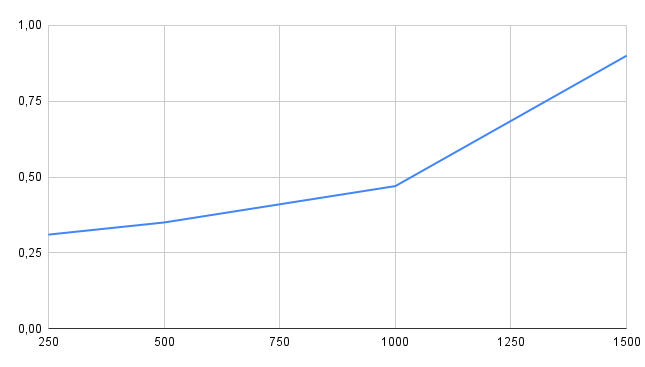
| Executions(per minutes) | Tasks (per minutes) | Execution Latency (in seconds) |
|---|---|---|
| 250 | 500 | 0,21 |
| 500 | 1000 | 0,23 |
| 1000 | 2000 | 0,23 |
| 1500 | 3000 | 0,33 |
| 2000 | 4000 | 14 |
Results for Kestra EE
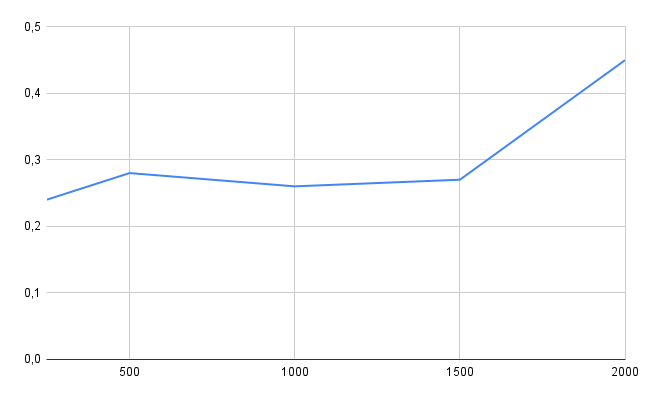
| Executions(per minutes) | Tasks (per minutes) | Execution Latency (in seconds) |
|---|---|---|
| 250 | 500 | 0,24 |
| 500 | 1000 | 0,24 |
| 1000 | 2000 | 0,27 |
| 1500 | 3000 | 0,28 |
| 2000 | 4000 | 0,30 |
| 2500 | 5000 | 0,35 |
| 3000 | 6000 | 0,39 |
| 3500 | 7000 | 0,90 |
| 4000 | 8000 | 0,64 |
| 4500 | 9000 | 4 |
Key takeaways
- At 250 executions/min (500 tasks/min), execution latency is approximately 200ms — similar to single execution time.
- Kestra OSS (JDBC backend) sustains up to 1500 executions/min (3000 tasks/min) with an execution duration of less than 1s, which is what we could realistically target for such a workflow.
- Kestra EE (Kafka backend) sustains up to 4000 executions/min (8000 tasks/min).
- Kestra EE has a slightly higher latency due to low throughput, but supports way higher throughput than Kestra OSS.
Benchmark 2 — Complex flow
Description
Triggered by a Webhook. Contains 5 If tasks with 2 subtasks each (only one executes per run).
This creates 10 task runs per execution and stresses the Executor.
id: benchmark02namespace: benchmarks
inputs: - id: condition type: BOOL defaults: true
triggers: - id: webhook type: io.kestra.plugin.core.trigger.Webhook key: benchmark
tasks: - id: if1 type: io.kestra.plugin.core.flow.If condition: "{{inputs.condition}}" then: - id: hello-true-1 type: io.kestra.plugin.core.log.Log message: Hello True 1 else: - id: hello-false-1 type: io.kestra.plugin.core.log.Log message: Hello False 1 - id: if2 type: io.kestra.plugin.core.flow.If condition: "{{inputs.condition}}" then: - id: hello-true-2 type: io.kestra.plugin.core.log.Log message: Hello True 2 else: - id: hello-false-2 type: io.kestra.plugin.core.log.Log message: Hello False 2 - id: if1-3 type: io.kestra.plugin.core.flow.If condition: "{{inputs.condition}}" then: - id: hello-true-3 type: io.kestra.plugin.core.log.Log message: Hello True 3 else: - id: hello-false-3 type: io.kestra.plugin.core.log.Log message: Hello False 3 - id: if4 type: io.kestra.plugin.core.flow.If condition: "{{inputs.condition}}" then: - id: hello-true-4 type: io.kestra.plugin.core.log.Log message: Hello True 4 else: - id: hello-false-4 type: io.kestra.plugin.core.log.Log message: Hello False 4 - id: if5 type: io.kestra.plugin.core.flow.If condition: "{{inputs.condition}}" then: - id: hello-true-5 type: io.kestra.plugin.core.log.Log message: Hello True 5 else: - id: hello-false-5 type: io.kestra.plugin.core.log.Log message: Hello False 5Results for Kestra OSS
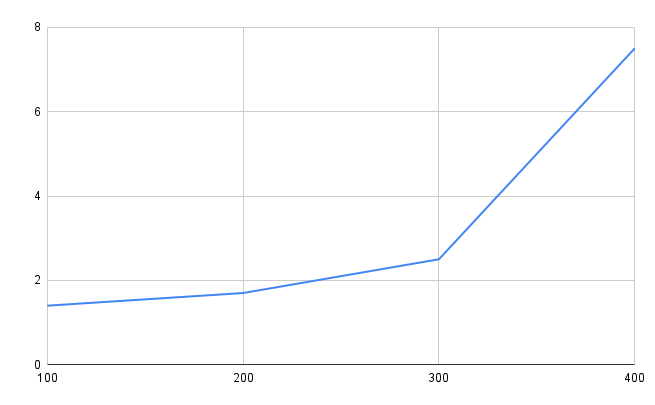
| Executions(per minutes) | Tasks (per minutes) | Execution Latency (in seconds) |
|---|---|---|
| 100 | 1000 | 0,7 |
| 200 | 2000 | 0,7 |
| 300 | 3000 | 0,9 |
| 400 | 4000 | 2,3 |
| 500 | 5000 | 18,4 |
Results for Kestra EE

| Executions(per minutes) | Tasks (per minutes) | Execution Latency (in seconds) |
|---|---|---|
| 100 | 1000 | 1,3 |
| 200 | 2000 | 1,4 |
| 300 | 3000 | 1,4 |
| 400 | 4000 | 1,6 |
| 500 | 5000 | 1,8 |
| 600 | 6000 | 1,9 |
| 700 | 7000 | 2,2 |
| 800 | 8000 | 4,8 |
Key takeaways
- At 250 executions/min (500 tasks/min), execution latency is approximately 1s — similar to single execution time.
- Kestra OSS (JDBC backend) sustains up to 400 executions/min (4000 tasks/min) with an execution duration of less than 3s, which is what we could realistically target for such a workflow.
- Kestra EE (Kafka backend) sustains up to 700 executions/min (7000 tasks/min).
- The Kestra Executor processing capability is independent of the type of tasks to process; the number of tasks per minute sustained in this benchmark is the same as in the first benchmark.
Benchmark 3 — Large ForEach loop
Description Executes 100 iterations of a ForEach loop with unbounded concurrency.
id: benchmark03namespace: benchmarks
tasks: - id: foreach type: io.kestra.plugin.core.flow.ForEach values: "{{range(1, 100)}}" concurrencyLimit: 0 tasks: - id: output type: io.kestra.plugin.core.output.OutputValues values: some: valueObservations
On average, the execution times for the OSS JDBC backend and EE Kafka are approximately 8s and 9s respectively.
That is about 25 tasks/s, as the ForEach task is executed on each iteration, so we will end up with 200 task executions.
This is lower than the throughput in the previous benchmarks because a single flow with many task runs creates a large execution context, which is costly to orchestrate.
Benchmark 4 — Realtime Trigger with JSON Transformation
Description
Consumes messages from a Kafka topic in real time, transforms them with JSONata TransformValue task, and outputs new data in the OutputValues task. This triples the size of the data in the execution context.
id: benchmark04namespace: benchmarks
triggers: - id: kafka-logs type: io.kestra.plugin.kafka.RealtimeTrigger topic: test_kestra properties: bootstrap.servers: localhost:9092 groupId: myGroup
tasks: - id: transform type: io.kestra.plugin.transform.jsonata.TransformValue from: "{{trigger.value}}" expression: | $.{ "order_id": order_id, "customer_name": first_name & ' ' & last_name, "address": address.city & ', ' & address.country, "total_price": $sum(items.(quantity * price_per_unit)) } - id: hello type: io.kestra.plugin.core.output.OutputValues values: log: "{{outputs.transform.value}}"Benchmarked with:
- Small messages (~1.6 KB)
- Medium messages (~16 KB)
- Large messages (~160 KB)
Results for Kestra OSS
With 1.6 KB small-sized messages:
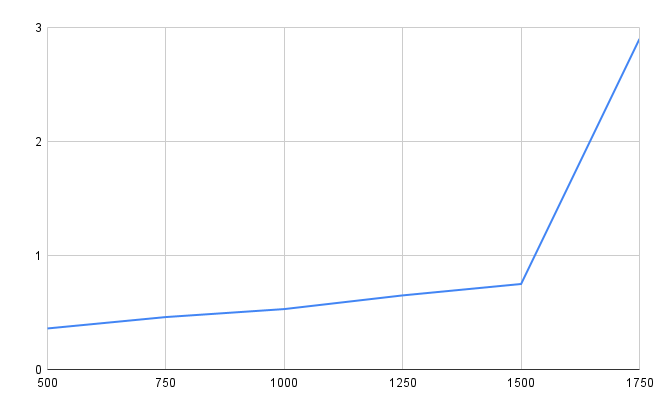
| Executions(per minutes) | Tasks (per minutes) | Execution Latency (in seconds) |
|---|---|---|
| 500 | 1000 | 0,23 |
| 1000 | 2000 | 0,25 |
| 1500 | 3000 | 0,32 |
| 2000 | 4000 | 10 |
With 16 KB medium-sized messages:
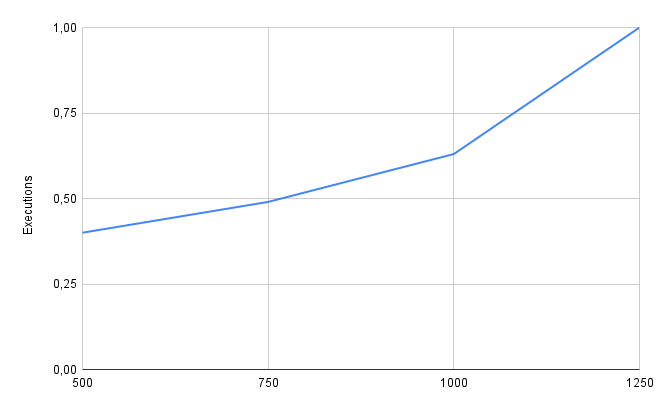
| Executions(per minutes) | Tasks (per minutes) | Execution Latency (in seconds) |
|---|---|---|
| 500 | 1000 | 0,30 |
| 750 | 1500 | 0,31 |
| 1000 | 2000 | 0,37 |
| 1250 | 2500 | 0,81 |
| 1500 | 3000 | 3 |
With 160 KB large-sized messages:
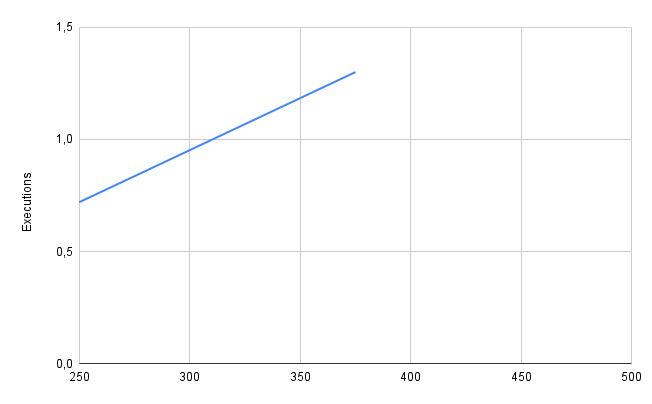
| Executions(per minutes) | Tasks (per minutes) | Execution Latency (in seconds) |
|---|---|---|
| 250 | 500 | 0,48 |
| 375 | 750 | 0,6 |
| 500 | 1000 | 2,4 |
| 625 | 1250 | 26 |
Results for Kestra EE
With 1.6 KB small-sized messages:
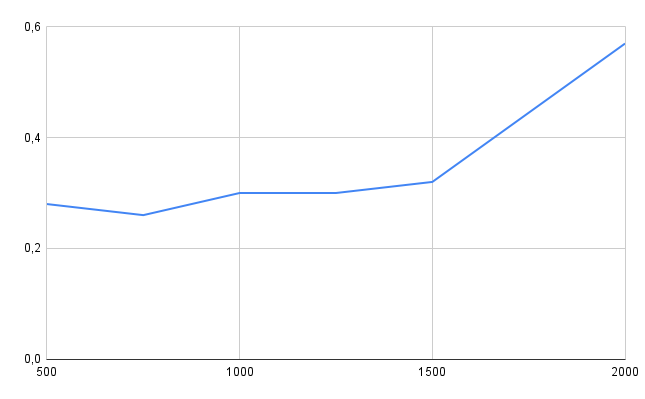
| Executions(per minutes) | Tasks (per minutes) | Execution Latency (in seconds) |
|---|---|---|
| 500 | 1000 | 0,26 |
| 1000 | 2000 | 0,28 |
| 1500 | 3000 | 0,29 |
| 2000 | 4000 | 0,32 |
| 2500 | 5000 | 0,43 |
| 3000 | 6000 | 0,47 |
| 3500 | 7000 | 0,62 |
| 4000 | 8000 | 1,4 |
With 16 KB medium-sized messages:
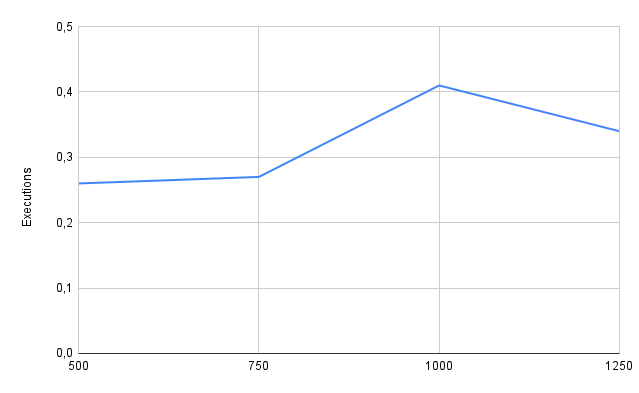
| Executions(per minutes) | Tasks (per minutes) | Execution Latency (in seconds) |
|---|---|---|
| 500 | 1000 | 0,26 |
| 750 | 1500 | 0,27 |
| 1000 | 2000 | 0,41 |
| 1250 | 2500 | 0,34 |
| 1500 | 3000 | 0,34 |
| 1750 | 3400 | 0,38 |
| 2000 | 4000 | 0,43 |
| 2250 | 4500 | 0,47 |
| 2500 | 5000 | 11 |
With 160 KB large-sized messages:

| Executions(per minutes) | Tasks (per minutes) | Execution Latency (in seconds) |
|---|---|---|
| 250 | 500 | 0,29 |
| 375 | 750 | 0,29 |
| 500 | 1000 | 0,38 |
| 625 | 1250 | 0,36 |
| 750 | 1500 | 0,8 |
Key takeaways
- Small messages: Similar performance to Benchmark 1, which is expected.
- Medium messages: Kestra sustains up to 1250 executions/min (2500 tasks/min) with an execution duration of less than 1s, which is what we could realistically target for such a workflow.
- Large messages: Performance starts to degrade significantly, which is expected due to the increased Worker workload and Executor sensitivity to execution size.
- EE sustains higher throughput than Kestra OSS (7000 tasks/min vs. 2500 tasks/min) in real-time scenarios for small messages.
Conclusion
Kestra is a platform, not just a framework. It provides orchestration plus logging, metrics, retries, SLAs, error handling, governance, and observability. While this adds overhead compared to lightweight tools, performance is balanced with feature richness.
Kestra is designed for high performance in workflow orchestration and task dispatching, ensuring minimal time spent in the orchestrator and more time in actual task execution. Thanks to continuous performance tuning by the engineering team, Kestra remains among the fastest, most high-performing workflow orchestrators in every release.
To further note, Kestra is built to scale horizontally. When a use case demands it, seamlessly add Executor/Worker nodes to further increase throughput.
We will try our best to keep this page up to date with each new Kestra release. For more details on how to run this benchmark yourself, refer to our Benchmarks repository on GitHub.